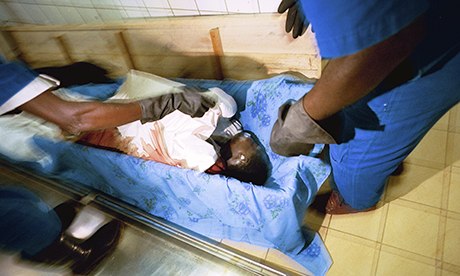Health ministry wants 700,000 men to undergo non-surgical circumcision to help lower HIV rate of 2.9%.
Rwanda says it has become the first country to launch a nationwide campaign to “non-surgically” circumcise 700,000 men in an attempt to cut rates of HIV infection.
The health ministry said circumcision was a crucial part of its strategy for achieving an Aids-free generation in Rwanda, where the adult HIV rate of 2.9% is already among the lowest in Africa.
Agnes Binagwaho, the health minister, said at the project’s launch: “Rwanda is the first country to launch non-surgical adult male circumcision with an aim of reducing HIV infection.”
The ministry said it aimed to circumcise 700,000 males between the ages of 15 and 49 across the country by the end of 2016. It is receiving support from the Global Fund to Fight Aids, Tuberculosis and Malaria, the US and the UN.
Non-surgical circumcision involves the use of a plastic device called PrePex, comprising two rings and an elastic band, that cuts off blood supply to the foreskin, which loses sensation and shrivels, similar to the process of removing the umbilical cord of a newborn child. The PrePex has to be worn for a week, after which it is removed and the dead foreskin is cut off.

An HIV/Aids victim at Kigali morgue. Rwanda plans a nationwide campaign to “non-surgically” circumcise 700,000 men in a bid to cut rates of HIV infection. Photograph: Sean Smith for the Guardian
Its makers claim that men “can resume work and almost all daily activities shortly after the procedure”, with the device “designed to be placed, worn, and removed with minimal disruption”, although they should abstain from sex for six weeks afterwards.
The PrePex was approved by the World Health Organisation in May after three years of clinical trials and has also been cleared by the US Food & Drug Administration. Binagwaho said it had been “clinically validated as a bloodless procedure that doesn’t necessitate injected anaesthesia”.
Studies have found that voluntary medical male circumcision reduces the risk of heterosexually acquired HIV/Aids infection by roughly 60%. The PrePex, made by an Israeli company, Circ MedTech, is already being used in Botswana, Kenya, Mozambique, South Africa, Uganda, Zambia and Zimbabwe.
Concerns have been raised about its price, usually around $20 (£12.34). Unitaid, a global health initiative to raise funds, has said more market competition is needed to make PrePex affordable for supply to the world’s poorest people.






